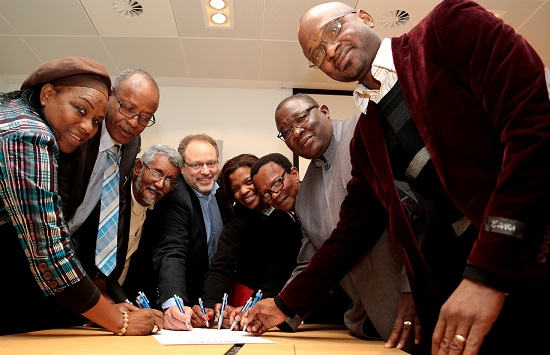
Three questions guided our exchanges and joint reflections: Why should we concern ourselves with the environment? How have we taken ownership of this issue to date? How is our trade union action being adapted?
New awareness and trade union demands have, first of all, arisen out of an observation. It is what Benjamin Denis, advisor to the European Trade Union Confederation, has presented as the three “S”: science, solidarity and sagacity.
Science, because climate change is here. It heightens the risk of economic, social and migration conflicts, which destabilise our societies.
Solidarity, because the most vulnerable populations in the North and the South are paying the highest price. The most industrialised countries are consuming the most and are already running up a debt for the last-born on the planet.
Sagacity, because inaction could cost us 20% of GDP, as compared with the cost of action, which only represents 1.5% of GDP. That is why the international trade union movement is calling for a binding international agreement.
A just transition is needed for the most vulnerable, based on differentiated treatment, the driving force of decent work for all, with respect for human and trade union rights. But how do we implement this just transition?
The CGSLB recommends concrete actions to avoid greenwashing as well as taking practical ownership of these issues. The integration of environmental challenges within the confederation’s liberal social values rests on two principles: responsibility and solidarity.
Three resolutions passed at the 2008 Congress of the CGSLB-ACLVB set out the guidelines for trade union action: opting for a market economy corrected by social and environmental measures, taking on board environmental imperatives in companies, and contributing, through social dialogue, to ensuring that employers meet broader and more sustainable objectives.
COSATU and SACCAWU from South Africa, the CSB from Burkina Faso, the UNTC from DR Congo, the CNTS from Senegal, the FNTT-SI from Burundi and the CGTM from Mauritania also have first-hand experience of tackling climate issues.
The impact is very local and very real: uncertain seasons, diminishing agricultural land, plastic pollution, etc. Today, their actions are focused on raising awareness and strengthening knowledge and accountability through trade union training and education for union representatives. They are coordinating cross-sector action. The CNTS from Senegal has also been equipped with resolutions since its Congress in 2006. Projects have been implemented involving the fishing sector, reforestation, urban agricultural or recovery and short food supply chain operations.
Sharing our thoughts and experiences unites us in our commitment to trade union action that turns the challenges posed by climate change into drivers of opportunity and adaptation. We are adapting trade union action to climate issues to ensure decent work, rather than hiding behind false problems regarding the technical nature of these issues.
It is in this way that we are able to place employment and the environment on an equal footing. By sharing our policy perspectives and our experiences on the ground or at inter-union level, we are able to give the joint attention required and to join forces in the effort to build sustainable international trade unionism.
The exchanges concluded with the signing of a charter outlining our commitment to the sustainable route of cooperation in which climate issues form an ever-growing part of our responsibilities and solidarity.

